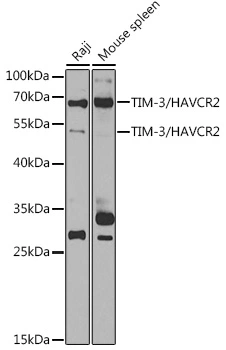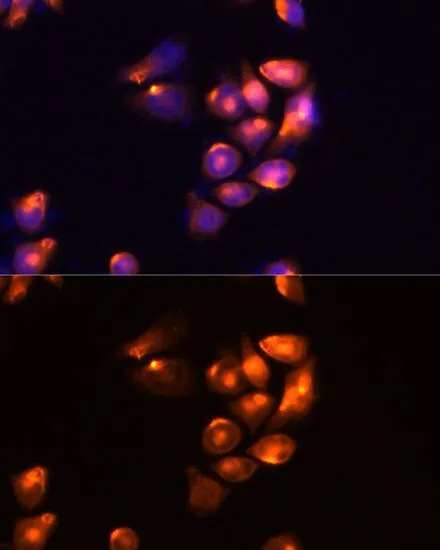
WB analysis of various sample lysates using GTX65883 TIM-3 antibody. Dilution : 1:1000 Loading : 25microg per lane
TIM-3 antibody

GTX65883
ApplicationsImmunoFluorescence, Western Blot, ImmunoCytoChemistry
Product group Antibodies
ReactivityHuman, Mouse
TargetHAVCR2
Overview
- SupplierGeneTex
- Product NameTIM-3 antibody
- Delivery Days Customer9
- ApplicationsImmunoFluorescence, Western Blot, ImmunoCytoChemistry
- CertificationResearch Use Only
- ClonalityPolyclonal
- ConjugateUnconjugated
- Gene ID84868
- Target nameHAVCR2
- Target descriptionhepatitis A virus cellular receptor 2
- Target synonymsCD366; HAVcr-2; hepatitis A virus cellular receptor 2; kidney injury molecule-3; KIM-3; SPTCL; T cell immunoglobulin mucin 3; T-cell immunoglobulin and mucin domain-containing protein 3; T-cell immunoglobulin mucin family member 3; T-cell immunoglobulin mucin receptor 3; T-cell membrane protein 3; TIM3; Tim-3; TIMD3; TIMD-3
- HostRabbit
- IsotypeIgG
- Scientific DescriptionThe protein encoded by this gene belongs to the immunoglobulin superfamily, and TIM family of proteins. CD4-positive T helper lymphocytes can be divided into types 1 (Th1) and 2 (Th2) on the basis of their cytokine secretion patterns. Th1 cells are involved in cell-mediated immunity to intracellular pathogens and delayed-type hypersensitivity reactions, whereas, Th2 cells are involved in the control of extracellular helminthic infections and the promotion of atopic and allergic diseases. This protein is a Th1-specific cell surface protein that regulates macrophage activation, and inhibits Th1-mediated auto- and alloimmune responses, and promotes immunological tolerance. [provided by RefSeq, Sep 2011]
- ReactivityHuman, Mouse
- Storage Instruction2°C to 8°C,-20°C or -80°C
- UNSPSC12352203

